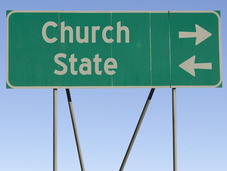
In his Encyclical Longinqua (1895) Pope Leo XIII denounced the view that the American system of Church-State relations should be the ideal and went further by stating that it was not even “universally lawful or expedient”. While he acknowledged that the at that particular time the Church in America enjoyed freedom from government interference he also wrote that “although this is true, it would be very erroneous to draw the conclusion that in America is to be sought the type of the most desirable status of the Church, or that it would be universally lawful or expedient for State and Church to be, as in America, dissevered and divorced.”[1] In the same paragraph Pope Leo XIII also argued that the Church “would bring forth more abundant fruits if, in addition to liberty, she enjoyed the favor of the laws and the patronage of the public authority.” Keep in mind that this Encyclical was written when government in America was much more accommodating towards Christianity than it is today. Back then teacher led prayer was permitted in public schools and the ten commandments could be posted on a public classroom’s bulletin board. But in spite of this the American government’s relationship with the Church was not a model which other nations should adopt.
[1] Leo XIII, Encyclical Longinqua (1895) 6.
 RSS Feed
RSS Feed
